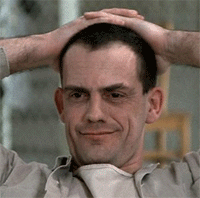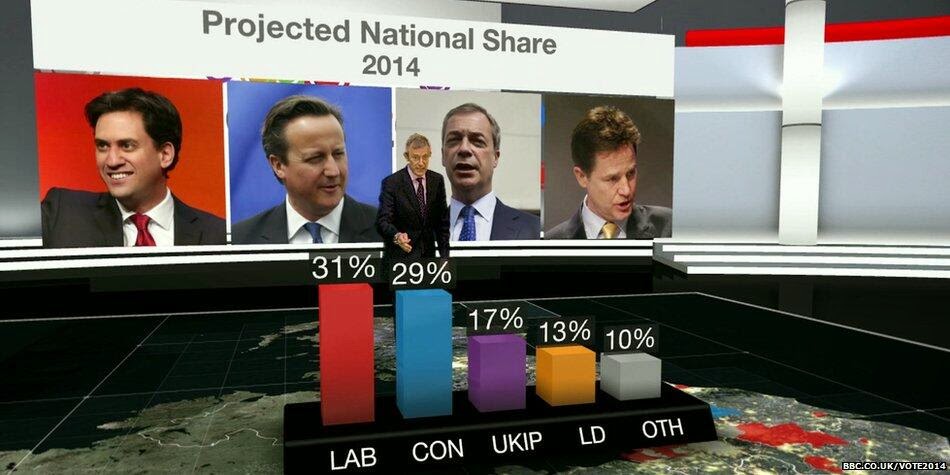
I think we can all be agreed that the #Vote2014 coverage of local council elections left a little to be desired. An over emphasis on the situation with UKIP, the audacity of sending reporters to clearly UKIP friendly areas and being flabbergasted at the fact that UKIP is something people talk about when asked about the elections, and generally spending their air time talking to politicians about what the public must be thinking based on the votes coming in rather than...you know...asking the public. At one point we genuinely had a two labour figures being interviewed against each other about the state of politics. Crazy.
However I'm sensing around social media that people are firmly still in the "denial" stage of grief when it comes to UKIP. You may argue with the term "earthquake", but it is utterly delusional to not agree that UKIP are facing a frantic surge in popularity every time an election rolls around. The reason why some are calling this an "earthquake" or a shake up of politics, or the beginning of four party politics, is that UKIP support is spreading (outside of London) and entrenching.
In 2012, the first real year of local "success" for UKIP they didn't have enough support to warrant giving them their own spot in the "projected national share" projections that the BBC creates from the councils it gets full results for. They polled 13% in the few places they stood, but this wasn't a wide enough base to give them any meaningful peg on the national vote share ladder.
Then came 2013, and a whopping 23% prediction of the national vote if this had been a general election.

However, yesterday comes and UKIP are "only" pegged at 17% in a projected national share, a full 4% above the Liberal Democrats and in third place. By any standards, in an election where such a large amount of the country's local councillors are elected, this is a big deal.

Cue "The Mass Denial". "Their support is dropping!" they say. "This doesn't matter because turnout is so low!" they say. "It's just a protest vote, it'll go away!" they say.

One of the sad things about politics, I find, is that generally people vote the same whether it's 20% of people voting or 70%. There are of course not insignificant variations as different interest groups and political groups are brought into the fold by higher turnout, and higher turnout has the general effect of moving the pointer from one direction (usually the disaffected protestors) to another (the prgamatic and loyal). You can see it from previous projected national shares of the vote, taking what people do on a turnout of 35% nationally can translate into a fairly decent idea of what would happen at 60-70% turnout.
Look at 2009. Lib Dems are a viable third place party by this point, however they were also seen as a party propped up by protest votes. The BBC gave them a projected national share of 28% compared to Labour's 23%, with the Tories on a downward trend at 38%. The actual 2010 result? Tories 36%, Labour 29% and Lib Dems on 23%.
Labour voters turned up at the General Election in a way they didn't at local elections, and by contrast Lib Dems fared worse on vote share nationally with their MPs than their councillors. Is this the key to showing that UKIP's support is a protest vote like Lib Dems? That their 17% will fall to 12% or below?
Perhaps, or perhaps because demographically the Lib Dems and UKIP are mirror images of each other, with UKIP commanding a legion of fringe supporters that are a) Motivated for wholesale change rather than just no tuition fees and b) part of a generation that holds a sense of civic pride in voting, the chances of their share dropping quite so high as that of the Lib Dems circa 2009-2010?
But what of this idea their support is dwindling? A fantasy, as far as I'm concerned.

In 2013, the first year where the BBC deemed it necessary to give UKIP their own slot on the projected national share, was a year where many councils were electing their councillors, but not London, not Wales, not a number of larger areas and cities. Previously UKIP had been part of "Others" which had a share of 15%, but were left with 9% when UKIP moved out.
Going from around 5-6% as part of the "Others" to 23% was always a monumental leap. It was likely questioned at the time by the very people now using it as gospel to show that UKIP are "on the slide" rather than on a surge.

But it didn't include areas that we now know are not very UKIP friendly, predictably areas with higher proportions of migrants and diverse communities. If you take the results from places like London away this notion that UKIP have done worse than in 2013 slips away very easily. They have, more accurately, performed about the same as last year if not a little better.
Their council seat wins are consistent with 2013, and in seats that they didn't win they've started to put themselves in 3rd or even 2nd spots. They've not won any councils, but quite frankly it would be a thunderous earthquake if, in the space of two years, UKIP gained control of a council let alone more than one.
Then there is national polling.

Opinion polls are fairly reliable. People that aren't seeing the results they want like to believe they're not, and people that are seeing results they want maybe put a little bit too much stock in individual ones. Take the Greens. They feel they're surging, despite their opinion levels being fairly consistent except into the run up of the EU elections for years (and in the EU polling they're doing no better than 5 years ago). But I digress.
In 2012 ICM (in my opinion the most accurate pollster) put UKIP around the local election dates on 3-4%. In 2013 at the same point of the year it was 18%, though this was a clear outlier where a support level of 7-9% is more accurate, and in 2014 is is keeping around 9-11%.

This is not the trend of a party losing support, it is one of a steady rise in support of nearly 10% in two years, though we should wait a few more months for these particular elections (and the outliers they seem to generate) to see how much more this could potentially rise. It's also worth noting that these spikes in support really seem to translate in to spikes in voting. In my opinion it's not all coincidence their support was around 18% in the lead up to the 2013 local elections and the 17% they're projected right now.
UKIP are here, and they may not realistically be much more of a party than the Greens are as it stands, but they are also showing all the signs of taking this seriously. The BNP were just a bunch of ranty, illiterate, racists that managed to somehow pool enough brainpower to form a party. UKIP are already talking, quite sensibly, about how they're going to target seats to grow their support, to grow their volunteer base...to do all the things a serious political party does to move from being a protest party into one that retains consistent base levels of support.
Best case scenario at the moment is that their support plateaus while the other parties work out a way to mitigate the effects of the UKIP narrative, but with Labour seemingly happy to play deferentially to UKIP as if they have the answers, and Tories not quite sure whether they should be attacking UKIP or trying to show people that they're not that different from them, I'm not sure that's a guaranteed outcome either.
Sitting and pretending the rise of UKIP isn't happening, or being anal over whether or not this constitutes an "earthquake" or not is a waste of effort. The question right now is if the large number of people not voting feel proportionally any different to the proportion of people that voted, and for the other parties to find the solution to getting those usually non-voting people into the voting booths...and to find that solution fast because UKIP seem to have got a solution all of their own and they're already using it.
No comments:
Post a Comment
Got something to say about my post? I'd love to hear it!
Try to keep it civil, I don't delete comments unless obliged to or feel the thread is getting too out of hand, so don't make me do it.